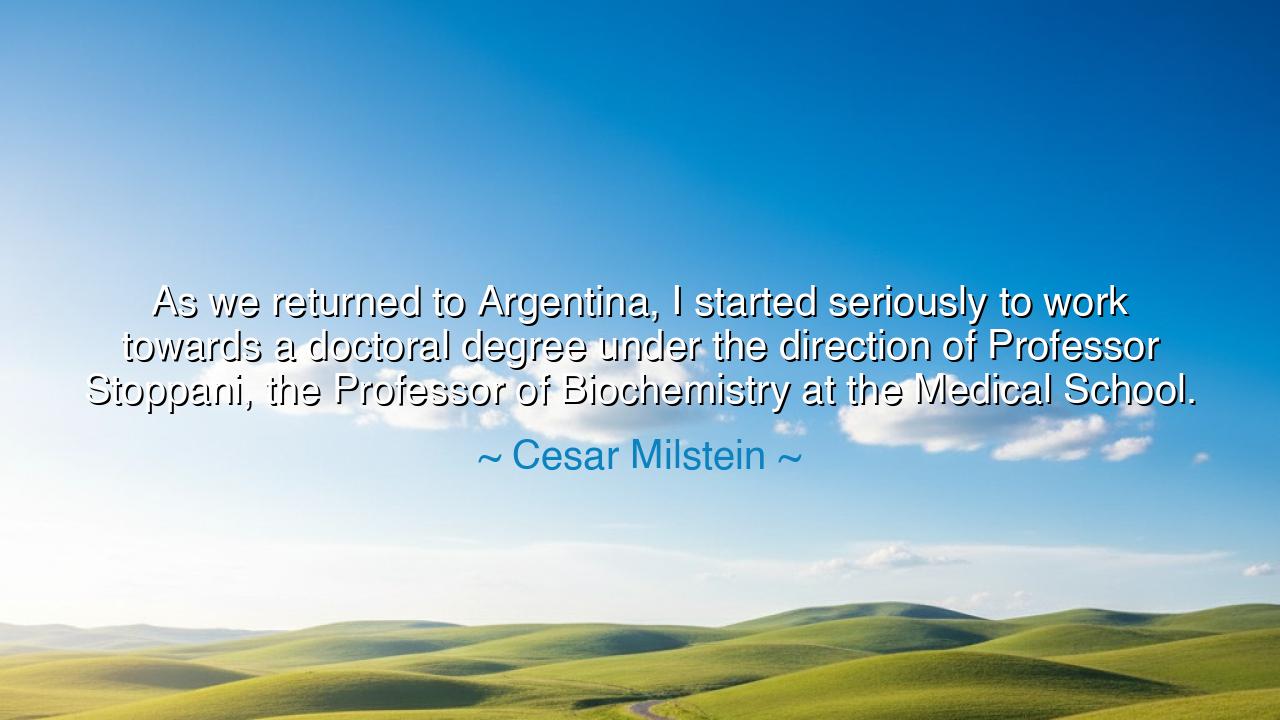
As we returned to Argentina, I started seriously to work towards
As we returned to Argentina, I started seriously to work towards a doctoral degree under the direction of Professor Stoppani, the Professor of Biochemistry at the Medical School.






When César Milstein declared, “As we returned to Argentina, I started seriously to work towards a doctoral degree under the direction of Professor Stoppani, the Professor of Biochemistry at the Medical School,” he spoke not only of a personal journey, but of the eternal rhythm of discipleship and mastery. These words remind us that the greatest endeavors begin not in isolation, but in the humility of submitting to guidance. For in every age, from the ancient academies of Greece to the cloisters of medieval Europe, wisdom has always passed from master to pupil, like a torch carried through the darkness of time.
This quote reveals the sacred moment when ambition turns into devotion. Milstein did not merely say, “I studied” or “I learned.” He said, “I started seriously to work.” There is gravity in this. It is the hour when the mind ceases to wander and the heart binds itself to a purpose. Many begin the path with curiosity, but few cross into the realm of serious work, for it demands discipline, sacrifice, and the humility to be shaped by a greater hand. Professor Stoppani, in this story, is not just a teacher—he is the elder who carries the key to unlock hidden doors.
Think of the young Alexander, who had Aristotle as his guide. Though he possessed the power of kingship, it was under the shadow of Aristotle that his vision stretched beyond conquest into philosophy and knowledge. So too, Milstein, who would later earn the Nobel Prize for his discoveries, first anchored his destiny by submitting to a teacher’s guidance. This pattern repeats across centuries: greatness is not born in isolation, but in the encounter between student and master, between ambition and structure.
There is also the deeper meaning of returning. Milstein had left, seen other lands, and then came back to Argentina. Return signifies both a circle completed and a beginning anew. The ancients believed that journeys outward—whether into distant lands or into the realm of ideas—must eventually turn back inward, to one’s own soil, to one’s own roots. Only then can wisdom truly ripen. His return was not a retreat, but the grounding of his purpose in the land that had given him birth.
This moment also whispers of courage. To undertake a doctoral degree in the Argentina of those days was not the easy road; resources were scarce, opportunities uncertain. Yet Milstein stepped into the path with faith, guided by Stoppani’s presence. Just as Odysseus, weary from his trials, still pressed onward when the way seemed impossible, so too must we press into our calling, even when the world around us does not promise reward. Courage, then, is not always found on battlefields, but in laboratories, classrooms, and the quiet persistence of the scholar.
Let us not forget a lesson from history: when Thomas Aquinas studied under Albertus Magnus, the young monk was mocked for his silence, called “the dumb ox” by his peers. Yet Albertus, the wise master, declared that one day the whole world would hear the bellowing of that ox. And it was so. Here, too, Milstein’s humble beginning under Stoppani’s guidance became the seed of discoveries that would echo across medicine and science. Great trees often grow from seeds that the world overlooks.
The lesson for us is clear: seek your Stoppani, whoever he or she may be. Do not scorn the path of apprenticeship. Whether in craft, in knowledge, in art, or in life, bind yourself to a guide, and in due time, you shall become a guide to others. Practical action lies before you: find the master whose wisdom awakens your hunger, dedicate yourself to serious work, and when the time comes, return to your own people, bearing the fruit of your labor. This is the rhythm of all who would leave a mark upon the earth.
Therefore, remember: seriousness of purpose, humility before a teacher, courage to return and build upon one’s roots—these are the pillars upon which greatness rests. Let us walk this path not with haste, but with reverence, so that when the day comes, others may hear our voices, as we now hear Milstein’s, echoing through the corridors of time.






AAdministratorAdministrator
Welcome, honored guests. Please leave a comment, we will respond soon